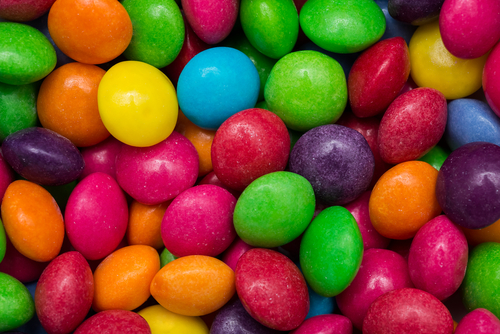Short answer
Skittles are bad for you. They have no nutritional value and many of the additives can have harmful effects on the body.
Recommended Alternative
Long answer
Skittles were originally brought to the United States by the British in the 1970s and since then have become one of the most popular candies in the US. Today, it is made by Mars and is recognizable by its catchy slogan, “Taste the Rainbow,” because of the variety of colors and flavors of their candies. The colored candies even went vegan in 2009 when they stopped including gelatin in their product. Skittles, however, are far from safe. They offer no health benefits, containing no fiber, protein, vitamins or minerals.
One of the most debated ingredients in Skittles is their food colorings, which include yellow 6 lake, red 40 lake, yellow 5 lake, blue 2 lake, yellow 5, red 40, yellow 6, blue 1 lake, and blue 1. Many have petitioned the FDA to remove these food colorings from the safe foods lists as Red 40 has been linked to hyperactivity in children, allergies, and hypersensitivity. Red 40 contain contaminants that may lead to cancer. In some studies, Red 40 was even shown to damage the DNA in mice. Other food colorings like tartrazine, known as yellow 5, are even banned in some countries because it can trigger many allergic reactions and may even lead to asthma.
Another harmful ingredient in Skittles is hydrogenated oil. Skittles contains hydrogenated palm kernel oil, which means that the oil was processed in order to give Skittles more shelf life and solidify the candy. Hydrogenation is the process of giving natural oil more hydrogen molecules, thus altering its molecular structure. The alteration of their molecular structure converts the once liquid oils into a plastic, solid consistency. Hydrogenated oils are harmful because they promote high cholesterol and high blood pressure when ingested into the body. Even small amounts of hydrogenated oils can cause dire effects.
Also found in Skittles is modified cornstarch, which is a food additive used as a thickening agent and stabilizer. Although modified cornstarch is a processed additive, it is not seen as harmful to one’s general health. However, it does not add any nutritional value. Corn syrup, on the other hand, has been linked to significant weight gain, increased risk of diabetes, cavities, and liver damage. Skittles are not recommended to be part of a regular diet.
Skittles contain about 47 grams of sugar per 2oz package. Skittles contain so much sugar, in fact, that a study conducted in 2008 at the University of Calgary found that Skittles might be helpful in relieving the effects of hypoglycemia, as it is as effective as a glucose tablet. Like corn syrup, the over-intake of sugar can lead to cavities, heart problems, obesity, and an increased risk of cancer.
Possible short-term side effects
- sugar rush
- blood sugar spike
- hyperactivity
Possible long-term side effects
- heart disease
- stroke
- diabetes
- high blood pressure
- high cholesterol
- cancer
Ingredients to be aware of
- artificial colors
- sugar
- corn syrup
- hydrogenated oils

Our Wellness Pick (what is this?)
YumEarth Organic Snacks
- Allergy-friendly
- Organic ingredients
- No artificial dyes
- Vegan and Non-GMO
- Gluten-free snack
 Approved by
Approved by 















